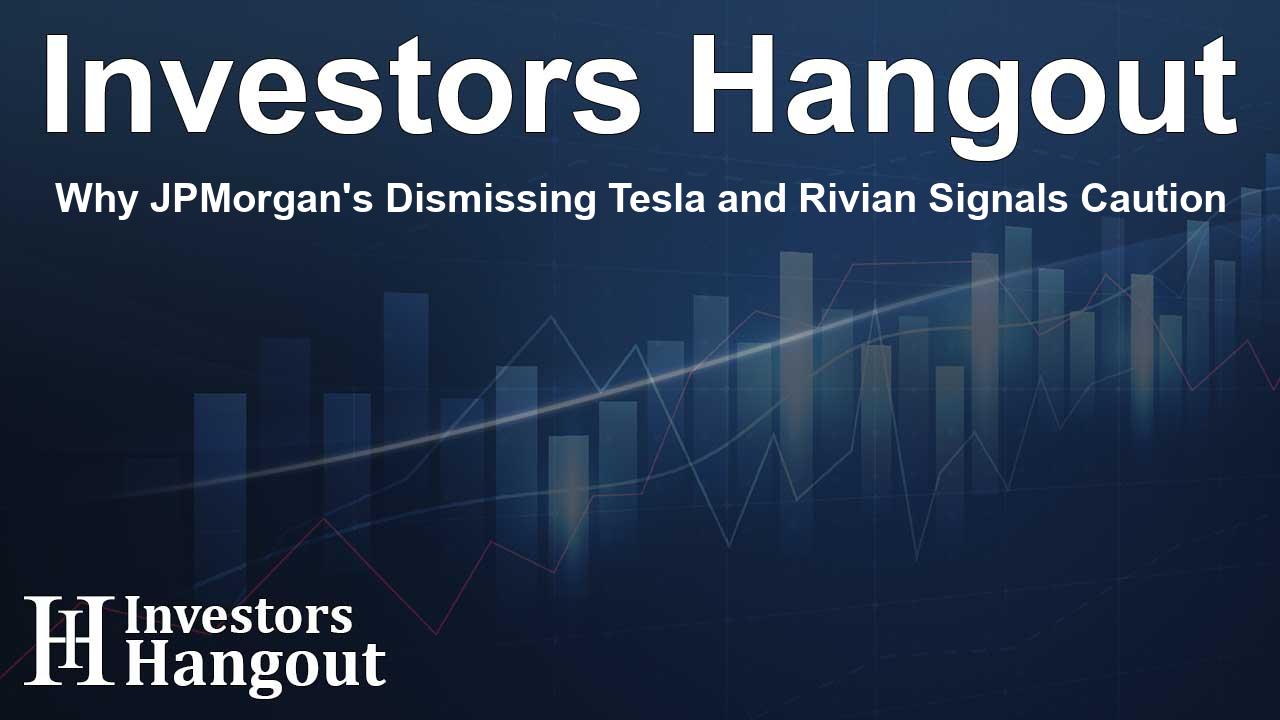Why JPMorgan's Dismissing Tesla and Rivian Signals Caution

JPMorgan's Shift on Tesla and Rivian
The electric vehicle (EV) market has been buzzing with excitement, but recent analysis from JPMorgan has taken a sharp turn. Analyst Ryan Brinkman has classified both Tesla Inc (NASDAQ: TSLA) and Rivian Automotive Inc (NASDAQ: RIVN) as top short picks for the remainder of this year. His insights suggest that both companies are at a pivotal crossroad, facing significant headwinds.
Underlying Concerns Driving JPMorgan's Analysis
Brinkman’s keen analysis reveals his concerns about overinflated valuations, diminishing subsidies for electric vehicles, and a troubling gap between market expectations and actual performance. The current trajectory suggests a looming disconnect that could catch unwary investors off guard.
Elaborating on Tesla's Challenging Prospects
Tesla, often hailed as the frontrunner in the EV space, is currently trading at a staggering 142 times its forward earnings. This valuation starkly contrasts with the average valuation of other major tech companies, which sits around 25.2 times earnings. The high multiple is hard to digest, especially with forecasts indicating a third consecutive year of declines in earnings per share (EPS).
Several factors contribute to this decline, including narrowing profit margins, reduced governmental financial support, and skepticism around Tesla's ambitious goals like the rollout of robotaxis. Brinkman’s skepticism stems from what he describes as a lack of sensor redundancy that would hinder autopilot capabilities.
Understanding the Implications of Tesla's Valuation
Essentially, while Tesla has prided itself on being a pioneer in autonomous driving technology, unresolved issues surrounding its autopilot and financial outlook present risks that need careful consideration.
Rivian's Financial Trials
On the other hand, Rivian is grappling with severe cash burn as it strives to position itself in the competitive EV landscape. With shares hovering just above $13, the situation appears bleak as the company struggles with enormous EBITDA losses.
Brinkman's analysis hits hard with the emphasis that the slashing of EV subsidies alongside rising tariffs could significantly impair Rivian's capacity to manage its cash flow. The challenge for Rivian is akin to climbing a mountain with a dead battery – a daunting scenario for any company attempting to scale up.
The Broader Implications for the EV Market
JPMorgan's warnings reflect a more extensive concern that the once-booming EV market may have reached an economic plateau. While the long-term outlook for EVs remains optimistic, it suggests that investors are currently paying inflated prices for potential future gains – risks that might just align with the challenges expected in the coming years.
Conclusion: Navigating the Future of EV Investments
In summary, the cautious stance from JPMorgan on Tesla and Rivian serves as a critical reminder for investors. With valuations soaring high while market realities appear increasingly complex, careful analysis and strategic decision-making will be vital for those looking to dive into the EV market. Understanding both the potential and pitfalls can provide a clearer roadmap for future investments.
Frequently Asked Questions
What led JPMorgan to recommend TSLA and RIVN as short picks?
JPMorgan's analysis pointed to high valuations, dwindling subsidies, and a disconnect between expectations and reality as key reasons for recommending these stocks for shorting.
How does Tesla’s valuation compare to other tech companies?
Tesla's current valuation is approximately 142 times its forward earnings, significantly above the average of about 25.2 times for other major tech firms.
What factors are contributing to Rivian's financial struggles?
Rivian faces high operational costs, massive EBITDA losses, and challenges related to reduced subsidies and rising tariffs impacting its profitability.
Are the long-term prospects for electric vehicles still positive?
Yes, while the immediate outlook indicates challenges, the long-term potential for electric vehicles remains strong despite short-term economic headwinds.
What does this mean for investors in the EV sector?
Investors should proceed with caution, analyzing company valuations and market dynamics closely to make informed investment decisions amidst changing conditions.
About The Author
Contact Thomas Cooper privately here. Or send an email with ATTN: Thomas Cooper as the subject to contact@investorshangout.com.
About Investors Hangout
Investors Hangout is a leading online stock forum for financial discussion and learning, offering a wide range of free tools and resources. It draws in traders of all levels, who exchange market knowledge, investigate trading tactics, and keep an eye on industry developments in real time. Featuring financial articles, stock message boards, quotes, charts, company profiles, and live news updates. Through cooperative learning and a wealth of informational resources, it helps users from novices creating their first portfolios to experts honing their techniques. Join Investors Hangout today: https://investorshangout.com/
The content of this article is based on factual, publicly available information and does not represent legal, financial, or investment advice. Investors Hangout does not offer financial advice, and the author is not a licensed financial advisor. Consult a qualified advisor before making any financial or investment decisions based on this article. This article should not be considered advice to purchase, sell, or hold any securities or other investments. If any of the material provided here is inaccurate, please contact us for corrections.
